Throwback Thursday: Darryl Monroe
Feb. 23, 2012
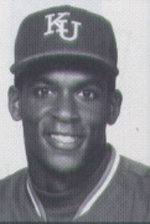 Darryl Monroe (Baseball) 1991-94
Darryl Monroe (Baseball) 1991-94
A Lawrence native, Monroe made his home town and home team proud, finishing with a .348 lifetime average to go along with 274 hits and 24 home runs during his four-year career. The two-time All-American helped lead the Jayhawks to the College World Series in 1993 and the NCAA Tournament the following year. After being drafted by the Montreal Expos, the outfielder played two years in the minor leagues before leaving the field to become a scout in the stands. Monroe is currently lives in Atlanta and is an area scout for the New York Yankees.
What made you want to play baseball at KU?
“I grew up in Lawrence, and even though I didn’t spend a lot of time watching Kansas baseball, I still spent a lot of time going to and watching KU basketball games. I grew up a diehard Kansas Jayhawks fan from as early as I can remember. I came to the realization later in my childhood that baseball was my best sport. The recruiting process began my junior year of high school, when I wasn’t heavily recruited by a lot of schools, but (former KU) Coach Bingham showed a great deal of interest, and coming to Kansas seemed like a natural fit.”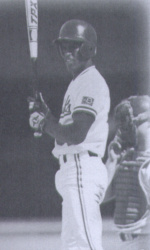
What are some of your best memories from your days at Kansas?
“I have a ton of memories, and certainly a lot of them are of the team struggling to find our way the first couple of years. We were trying to grow as a program, and Coach Bingham had been brought in a couple of years before I had arrived. We had some tough times the first couple of years, which made it really gratifying when we reached the level of success that we had my junior and senior years. The best memories I have are certainly of us breaking through to regionals in Knoxville, Tenn., and making it to the College World Series (in 1993), which was quite a spectacular feeling of accomplishment. Of course, playing in front of a big stage in Omaha is a great feeling as well.”
Growing up, did you have any major league players that you looked up to?
“Growing up in Lawrence, the Kansas City Royals were the team that I followed. Pretty much all of my youth, the Royals were highly competitive. George Brett was certainly the player I followed the closest; of course the Royals also had Willie Wilson, Frank White and Hal McRae – they were all fun players to watch. I was able to go to Royals Stadium and watch those guys play, which was very fun.”
You still rank in the top-10 of 10 different all-time KU statistical categories, what does that mean to you?
“It’s pretty neat because I guess I don’t give it a whole lot of thought – but I’m really at a loss for words. Seeing my name in the record book makes me feel good about all of the hard work that I put in while I was at KU. The teammates I had and the coaching I received makes it gratifying that I was able to accomplish what I did. It is very neat that those records are still there.”
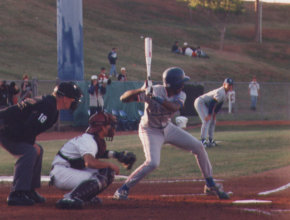 What did you have to do to have such a successful individual career?
What did you have to do to have such a successful individual career?
“It was a lot of hard work; the things that the coaches stressed – the work ethic, the hitting mechanics – those things they instilled in the players. The system that we had at KU enabled us to be successful; the coaches gave us an opportunity to have success. I tried to be diligent about the work I did and it paid off.”
You were very successful academically; how were you able to balance your schoolwork, along with being a Division-I baseball player?
“It was mainly time management and the good resources that we had. The environment I grew up in helped me as well; I was always told to take care of my responsibilities first, and that was something instilled in me from my parents and other members of my family. Whatever responsibilities I had, I made sure that I took care of them. I’ve always been a very competitive person, so getting good grades was very important to me.”
What was it like playing minor league baseball?
“Some of it is like what you hear in minor league folklore. A lot of long bus rides, a lot of terrible minor league parks; but you’re getting to play baseball every day, you are getting to do something you love and pursue a dream. It was exciting; it was certainly an exciting period in my life and I was able to play professional baseball in different cities around the country. Unfortunately, you get to a point where that career stops and you have to change direction. I wouldn’t trade anything in the world for the fact that I got to have that opportunity, and I feel fortunate that I was able to.”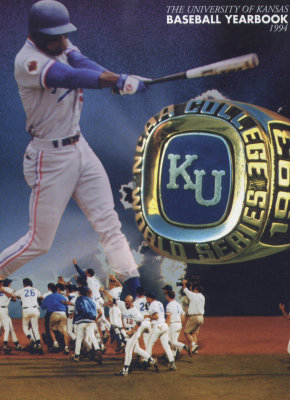
How did you decide you wanted to become a baseball scout once your playing career was over?
“It was a pretty natural transition; most athletes don’t decide on their own when their playing career is over, usually somebody decides that for them. My dream was always to play major league baseball, but I knew I always wanted to be involved in the baseball industry. I had an opportunity to interview for a couple of positions in scouting. Jim Fleming, who was the scouting director for the Montreal Expos at the time, was someone whose acquaintance I had made when I was at KU. I kept in touch with him and he had a couple area scouting jobs that were available, so I was fortunate enough to get one. It was me coming to a realization that my playing career was ending, and transitioning to my second career.”
What are your responsibilities as a scout for the New York Yankees?
“My primary responsibility is area scouting. I live in Atlanta, Ga., and I cover Georgia and South Carolina, so I see a lot of high school, junior college and four-year college players. I do that for pretty much the entire year, but I have additional assignments as well. I have professional scouting as well; so I will see minor league teams in the summer after the amateur draft. I’ve also had the opportunity to do some advanced scouting, where I’m covering (major league) teams that are likely to make the playoffs. It is a little bit different when you are scouting a particular opponent, where, as an area scout, you are looking at individual talent. It is a change of pace; I’m able to do different sorts of scouting with the Yankees and it has been a fun experience.”
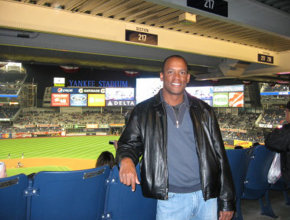
Are you able to follow KU when you are on the road?
“There is no doubt about it. A large part of my family still lives in the Lawrence area, so I come back a lot; I’m certainly a die-hard Kansas fan. It is easier to follow the sports that are on the national level, like the football and basketball teams, but I certainly try to see every event that is televised. I’ve had an opportunity to go to some of the games as I was able to go to the Orange Bowl in 2008, and I’ve also been to a few of the KU-MU games at Arrowhead Stadium. I certainly try to get to as many games as possible, and if I can’t, I’m always trying to get to a television to watch them.”
Throwback Thursday Archive: http://www.kuathletics.com/throwbackthursday.html

